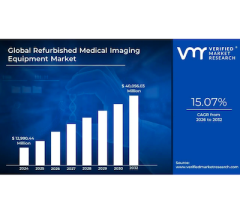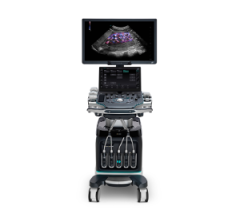
Getty Images
November 16, 2022 — GE Healthcare has joined the Department of Health and Human Services (HHS) and the White House in the pledge to decarbonize the healthcare sector and make healthcare facilities more resilient to the effects of climate change. An affirmation of its climate goals, the pledge reinforces GE Healthcare’s commitment to reducing organizational emissions by 50%, against a 2019 baseline, by 2030 and achieve net zero by 2050.
Currently, the healthcare sector accounts for 8.5% of U.S. emissions[1]. The emissions arise directly from healthcare facilities and indirectly from the supply chain. Studies also show that climate change can have a direct impact on people’s health, and increase the number of injuries, illnesses, and deaths[2].
The HHS Office of Climate Change and Health Equity (OCCHE), part of the Office of the Assistant Secretary for Health, developed the White House/HHS Health Sector Climate Pledge to help focus industry response to climate challenges. In addition to reducing their carbon footprint, signatories also commit to producing detailed plans to prepare their facilities for both chronic and acute catastrophic climate impacts.
“The connection between a healthy planet and healthy lives is clear,” said Kelvin Sanborn, ESG (Environmental, Social, and Governance) Program Leader at GE Healthcare. “With over two billion exams conducted every year using GE Healthcare equipment, we have a responsibility to intensify our actions to further reduce our emissions. Climate action is an integral part of our mission to improve outcomes for patients, healthcare providers, and researchers in the U.S. and beyond.”
GE Healthcare has set out and begun implementing a strategy around three pillars: facility footprint reductions, fleet electrification, and renewable energy. In 2021, GE Healthcare achieved a 7% reduction in greenhouse gas emissions against a 2019 baseline. The company has also signed up to the Science Based Targets initiative (SBTi). Aligned with the goals of the Paris Climate Agreement to limit global warming to 1.5°C, the SBTi gives companies a framework for defining climate targets with the long-term goal of achieving net zero emissions.
For more information: www.gehealthcare.com
Find more RSNA22 coverage here
References:
[1] Yale Insights. Uncovering Healthcare’s Hidden Climate Impact. June 30, 2021. Available here: https://insights.som.yale.edu/insights/uncovering-healthcares-hidden-climate-impact
[2] Health Affairs. Health Risks Due To Climate Change: Inequity In Causes And Consequences. December 2020. Available here: https://www.healthaffairs.org/doi/10.1377/hlthaff.2020.01125


 February 17, 2026
February 17, 2026 









